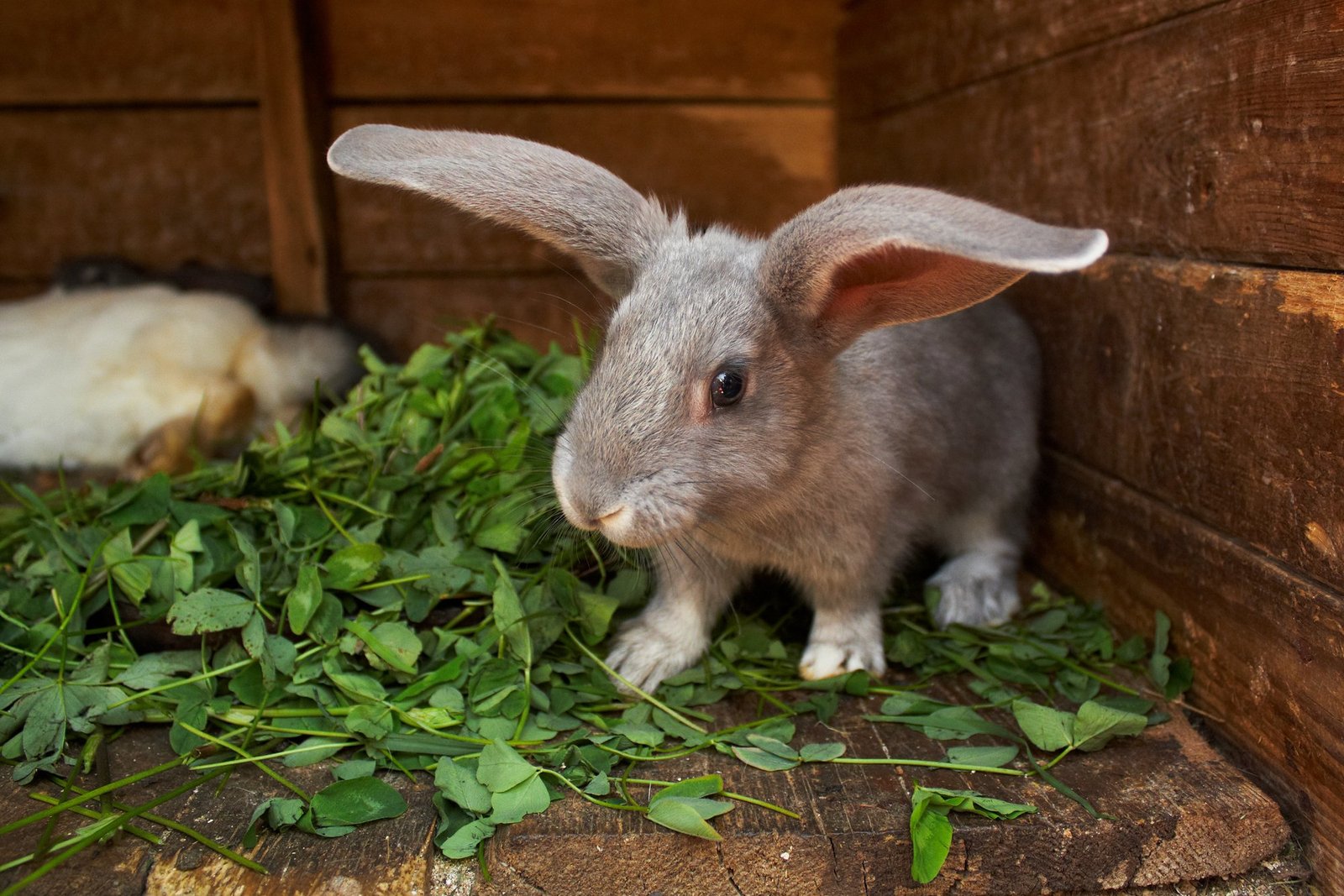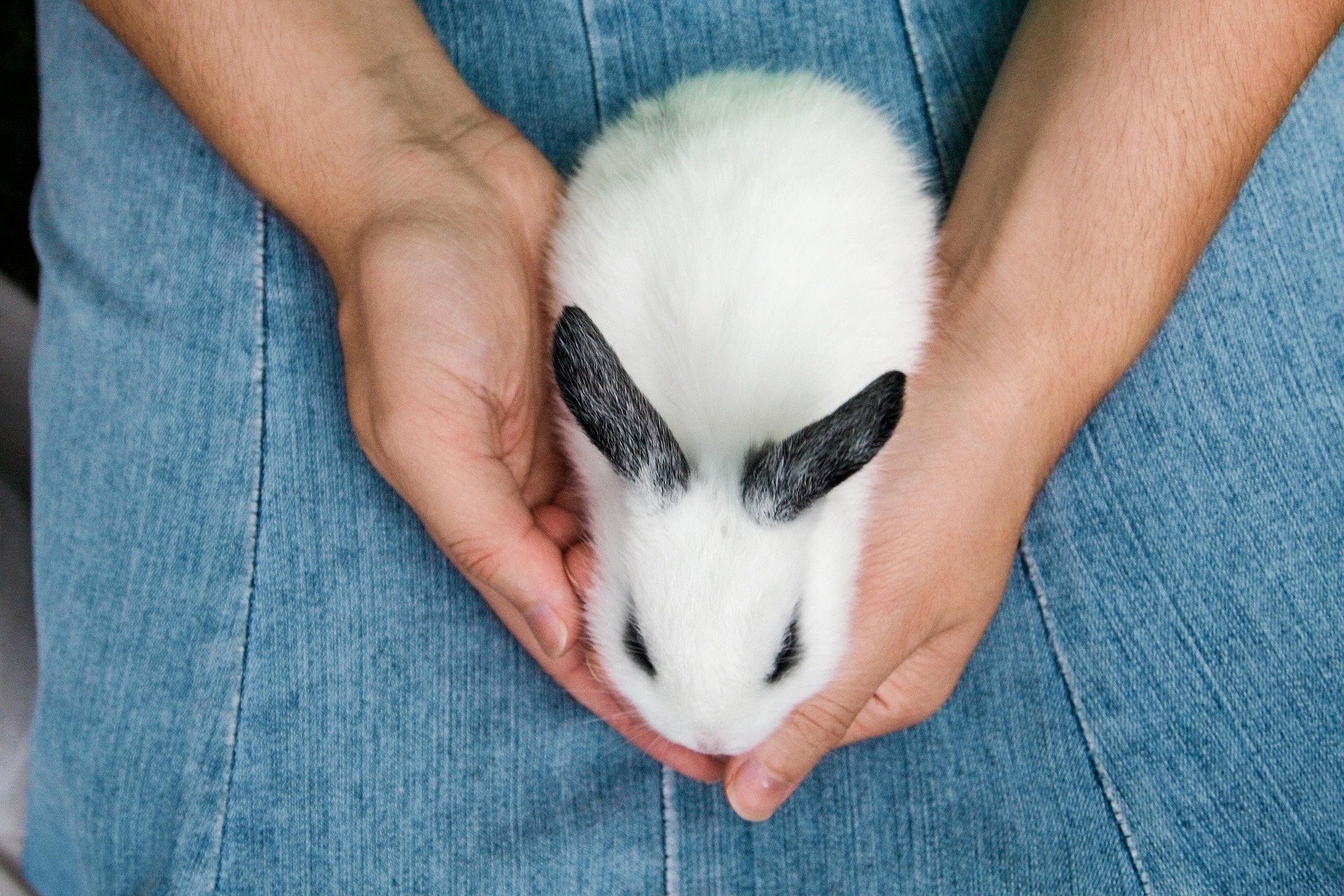How Do Rabbits Show Fear Or Anxiety

Rabbits are prey animals, so they have developed some behaviors to help them avoid being eaten. One of these is showing fear or anxiety. When a rabbit is afraid, it will often freeze in place and hope that the predator does not see it.
If that does not work, the rabbit may run away as fast as it can.
Rabbits are prey animals, so they are constantly on the lookout for predators. When they sense danger, their first instinct is to run and hide. However, sometimes rabbits will freeze in place when they’re scared.
This is called tonic immobility, and it’s the rabbit’s way of trying to make itself less noticeable to predators.
If you think your rabbit is scared or anxious, there are some things you can do to help them feel more comfortable. First, try to identify what’s causing their fear.
If there’s a particular noise or animal that scares them, try to remove that trigger from their environment if possible. You can also provide your rabbit with hiding places where they feel safe, like a cardboard box or tunnel. Finally, give them plenty of love and attention when they’re feeling calm so they know they have nothing to be afraid of with you around.
Signs of a Depressed Rabbit
There are a number of signs that may indicate that a rabbit is depressed. These can include a change in eating habits, not wanting to play or exercise, being less active overall, and exhibiting changes in behavior, such as becoming more withdrawn or aggressive. If you notice any of these changes in your rabbit’s behavior, it’s important to take them to the vet for an evaluation to rule out any medical causes and to get them started on appropriate treatment if necessary.
How to Tell If My Rabbit is Scared of Me
If your rabbit is scared of you, there are a few things you can do to try and make them feel more comfortable. First, try approaching them slowly and talking to them in a soft voice. If they still seem nervous, try offering them a treat.
Once they start taking the treat from you, continue to offer it to them while you pet them. If they continue to be scared, consult with a veterinarian or animal behaviorist to see if there is anything else you can do.
How to Calm a Scared Bunny
If your bunny is scared, there are a few things you can do to help them feel more comfortable. First, try to identify what may be causing their fear. If they are afraid of loud noises, try to move them to a quiet room or put them in a crate with a blanket over it to muffle the sound.
If they are afraid of other animals, keep them separated from any pets in your home. You can also try placing them in a small room or an enclosed area so they don’t feel so exposed.
Once you’ve determined the cause of their fear, you can start working on helping them overcome it.
One way to do this is by slowly acclimating them to the thing they’re scared of. For example, if they’re afraid of loud noises, start by playing soft music near them while they eat or play. Gradually increase the volume over time until they become used to it.
If they’re afraid of other animals, start by letting them see the animal from afar and offering treats when the animal is around. Slowly bring the animal closer until your bunny is comfortable being near it.
It’s important to be patient when helping your bunny overcome their fears.
They may not make progress right away and it may take some time for them to feel completely comfortable again. But with patience and perseverance, you can help your bunny live a happy and stress-free life!
Signs of a Stressed Rabbit
We all get stressed from time to time, but did you know that even your furry little friend can suffer from stress? Just like us, rabbits can experience a range of emotions and sometimes they can get overwhelmed. If you think your rabbit may be stressed, here are some signs to look out for:
1. Loss of appetite – A stressed rabbit may lose their appetite and stop eating their usual amount of food. This is a big sign that something is wrong as rabbits need a constant supply of nutrients to stay healthy.
2. Excessive grooming – Some rabbits will excessively groom themselves when they’re feeling anxious or stressed.
This can lead to bald patches on their fur and sometimes even raw skin underneath.
3. Hiding away – If your usually social bunny suddenly starts hiding away from you and won’t come out for cuddles, it’s likely they’re feeling overwhelmed and need some space.
4. Teeth grinding – You might not be able to see this one yourself, but if you notice your rabbit grinds their teeth when they’re relaxed (a process called ‘bruxing’), it could be a sign that they’re feeling tense or stressed.
Scared Rabbit Behavior
When a rabbit is scared, their behavior can vary depending on the severity of the situation. If they are just startled, they may freeze in place for a moment before continuing on with what they were doing. If they are truly frightened, however, their behavior may be more extreme.
They may run away and hide, or even attack whatever is frightening them.
Rabbits are prey animals, so it’s natural for them to be afraid of things that could potentially hurt them. However, there are some things that rabbits shouldn’t be afraid of, like their owners.
If your rabbit is exhibiting scared rabbit behavior around you, it’s important to try to figure out what the problem is. It could be something as simple as a loud noise that scares them, or it could be something more serious like abuse or neglect.
If you think your rabbit is scared of you, the best thing to do is to try to slowly build up their trust again.
Start by offering them treats and petting them gently when they’re not expecting it. With time and patience, you should be able to help your rabbit feel more comfortable around you again.

Credit: vethelpdirect.com
What Do Rabbits Fear Most?
Rabbits are often thought of as timid creatures, and while they may startle easily, there are only a few things that truly scare them. One of the biggest fears for rabbits is being picked up. To a rabbit, being picked up off the ground means they are vulnerable and could be attacked.
This fear can sometimes be overcome with patience and gentle handling, but it’s important to always support their hind end so they feel secure.
Another big fear for rabbits is loud noises. This includes things like vacuum cleaners, hair dryers, and even raised voices.
To a rabbit, these sounds can signal danger and trigger their fight or flight response. If you have a loud household, try to give your rabbit a safe place to hide away from the noise until it subsides.
Finally, many rabbits are afraid of unfamiliar environments and people.
This is why it’s important to introduce new things slowly and give your rabbit time to adjust. If you have visitors over, keep them calm and avoid sudden movements or loud noises around your rabbit’s enclosure. With time and patience, your rabbit should eventually warm up to new faces – but some may always remain shy around strangers.
Can Rabbits Have Anxiety?
It’s normal for rabbits to have some anxiety. In the wild, rabbits are constantly on the lookout for predators, and their survival depends on being able to detect danger and flee quickly. As a result, even domestic rabbits tend to be alert and cautious by nature.
Rabbits can experience different types of anxiety, including separation anxiety, social anxiety, and fear of loud noises or unfamiliar environments. Signs of anxiety in rabbits include cowering, panting, trembling, grinding their teeth, and excessive grooming. If your rabbit is showing signs of anxiety, it’s important to talk to your veterinarian about possible treatment options.
5 Steps to Comfort a Rabbit When They're Scared
What are the common signs of fear or anxiety in rabbits?
Rabbits’ fear behaviors can manifest in various ways. They may exhibit trembling or shaking, thumping their hind legs to alert others, or flattening themselves to the ground. Fearful rabbits may also display aggressive behaviors like biting or scratching. Avoiding eye contact, attempting to hide, or increased heart rate are additional signs of anxiety in rabbits. Understanding these common fear behaviors is crucial in ensuring a safe and comfortable environment for rabbits.
Does Dominance Play a Role in Rabbit Anxiety?
Does establishing dominance in bonded rabbit pairs play a role in rabbit anxiety? Dominance hierarchies can occur in bonded rabbit pairs, where one rabbit establishes dominance over the other. This can lead to anxiety in the submissive rabbit, as they may feel constantly stressed due to the need to submit. Proper socialization and ensuring a balanced relationship within the pair is important to minimize anxiety in rabbits.
Conclusion
Rabbits show fear or anxiety in a variety of ways. They may freeze in place, run away, or hide. Their hearts may beat faster and their breathing may quicken.
Rabbits may also make noise, such as grunting, growling, or screeching.
